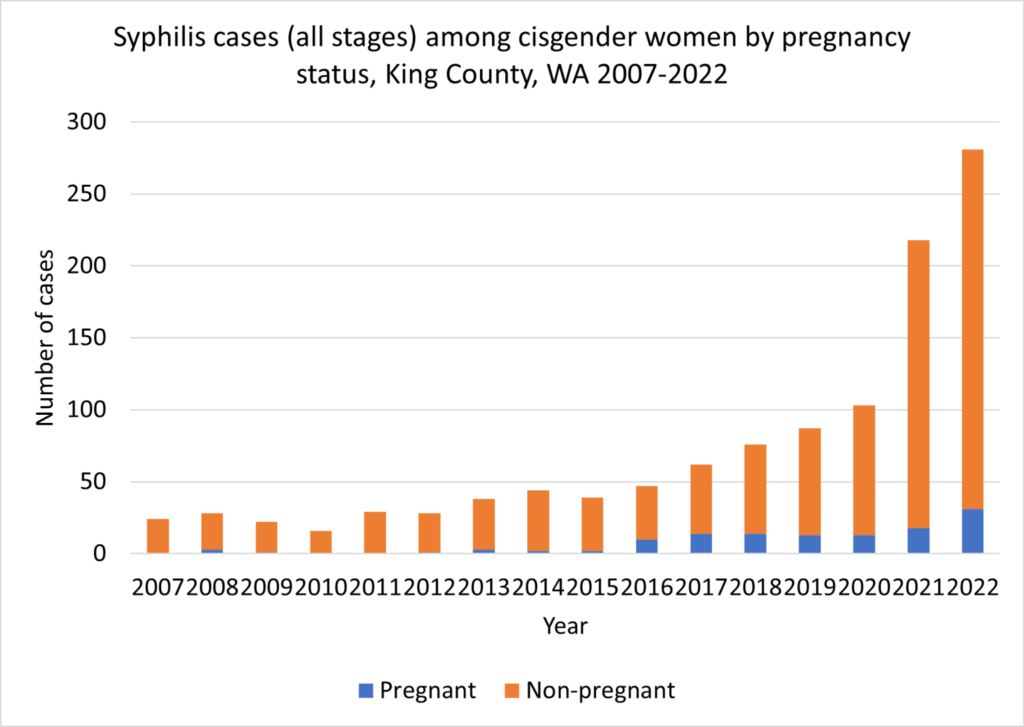
New Public Health recommendations make a syphilis test routine for women 45 and under
Hilary N. Karasz
Public Health – Seattle & King County
All sexually active women 45 and under in Washington state who have not had a syphilis test since January 2021 are being advised to test for syphilis.
This is according to a new recommendation from the Washington State Department of Health and Public Health – Seattle & King County.
There has been a nearly 5-fold increase in syphilis in cisgender women since 2015 (cisgender means one’s gender identity corresponds to one’s sex assigned at birth). This recommendation is aimed at preventing this disease in this population.
Congenital syphilis
Syphilis is a sexually transmitted infection. Congenital syphilis occurs when a fetus acquires the disease in the uterus before birth. This new recommendation also seeks to reduce the rising numbers of babies who are born with congenital syphilis, which is a devastating but preventable disease.
Syphilis in pregnancy can cause babies to be miscarried, stillborn, premature or have serious birth defects. It is preventable when the pregnant person is tested and treated at least a month before delivering the baby.
Congenital syphilis is relatively rare in King County, but we are concerned about increases in cases more recently. Prior to 2019, there had not been a case of congenital syphilis in King County for many years. In 2019 there were three reported cases and just one case in 2020. However, there were 11 cases of congenital syphilis in King County in 2021. Two of the babies were stillborn and five were born prematurely. Twelve cases of congenital syphilis have occurred in King County so far in 2022, resulting in 8 premature births and 9 babies with congenital syphilis symptoms.
Who is at risk?
Nationally, about 40% of pregnant persons with syphilis in 2021 did not have any risk factors at all. However, the people at highest risk for having a baby affected by congenital syphilis are those who are not receiving consistent pre-natal care, including people who are living unhoused, using methamphetamine or other drugs, and exchanging sex for compensation.
But, as the data are showing, even women without these risk factors are having pregnancies while infected with syphilis.
“The increase in syphilis in cisgender women and pregnant people suggest that syphilis may be spreading in the general population and among women in particular,” said Dr. Matthew Golden, Director of the Public Health – Seattle & King County HIV/STD Program. “Rising rates of syphilis in cisgender women and pregnant people is alarming, which is why we are recommending that most sexually active women 45 and under get tested if they haven’t had a test since 2021, and why we are asking providers to increase syphilis testing in pregnant persons.”
Other west coast states are making similar recommendations.
What is syphilis and how do you contract it?
Syphilis is a sexually transmitted infection caused by a bacteria. Early in infection, it can cause an ulcer on the genitals, mouth, or anus. In most cases, this eventually leads to a widespread rash. However, some people have relatively mild symptoms that go away without treatment, and many people with syphilis don’t know that they have it. This is why testing for syphilis is so helpful.
Untreated, syphilis can cause serious complications, including stroke, blindness, and hearing loss. As described above, syphilis can also be passed from a pregnant person to a child.
What Public Health is doing about syphilis
Syphilis has been on the rise in our community for several years, particularly among men who have sex with men, and Public Health continues to work to bring that epidemic under control.
We work to identify people, including pregnant persons, at highest risk for syphilis – and get them treated. We educate healthcare providers to identify patients at risk, work with providers to conduct targeted screening in emergency departments, screen people in correctional facilities, and have expanded investigations, data analyses, and outreach services to people with syphilis.
The bottom line
If you are a sexually active woman aged 45 or under and you have not had a syphilis test since January 2021, we recommend you ask your doctor for a test at your next appointment. While your own risk may be low, the test is a simple step for peace of mind.


